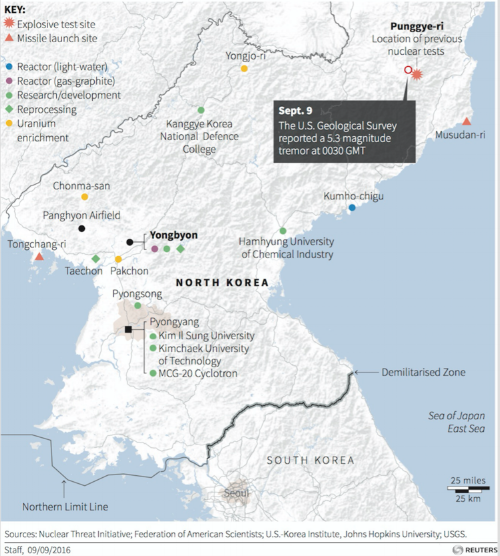Above: Also the biggest meeting of the Hair Club For Men.
A few months have passed since the historic summit between the American president and North Korea’s dictator. Since then, a few minor steps appear to have been made towards peace and denuclearization, but a lasting and comprehensive agreement has not been finalized. The president is already discussing the possibility of a second summit in 2019, but what were the results of the first one? The Center for Strategic and International Studies just published a report this week stating that North Korea continues to develop its nuclear program. This week, we’ll look back on the results of the first summit and evaluate the progress made since then.
As we’ve discussed before, North Korea has been worked to obtain nuclear weapons for decades. As is always the case with nuclear weapons, the regime is looking to have these to protect their own security rather than to actually use them against another nation (since doing so would ensure their own destruction). North Korea has a long history of making promises to disarm and then not following through. During the historic summit this past summer, both North Korea and the United States signed a joint declaration regarding peace and disarmament. Since then, some prisoners have been released, soldier’s remains have been returned, and one of their test sites has supposedly been dismantled. So is, as the president tweeted not long after returning from the summit, the North Korean threat over? These are some promising first steps, but there is much work that remains.
First of all, the text of this agreement has been criticized by many as being too vague to produce any meaningful results. It also lacks any definitive timeline, making the agreement open ended and open to vastly different interpretations of success. Some sites have opened to inspectors and select media groups, but there is strong evidence to suggest that North Korea still posseses many more testing and missile launching locations that they are not disclosing. It will be a long time (if ever) before North Korea opens up all locations for scrutiny. In the meantime, the United States continues to cancel military exercises with South Korea, potentially decreasing the military’s readiness for joint protection of the region.
The known locations of North Korea’s nuclear program.
The possibility of a second summit is an encouraging development, but it must be met with clear expectations and verifiable proof of progress. We should also still be extremely skeptical of promises to denuclearize. Almost no nation gives up nuclear weapons willingly, or at least not without very strong and compelling security agreements from stronger nations. China would be this backer for North Korea and has big goals for the region that it would want to pursue via North Korean negotiations. China would love to see America pull its military out of South Korea so it shouldn’t be surprising to see this as a demand in the near future. The reason this could be a problem is because South Korea depends upon American security guarantees for its own freedom. If American troops leave, there would be little to stop China from bullying South Korea and forcing its economic agenda on the region. An American departure would also signal to other allies like Japan that America is not a serious security backer.
Why should this matter to you? Well a denuclearized North Korea certainly makes us all feel safer (though it’s important to remember that nuclear powers acquire them for defense not offense). But more importantly, this can seriously improve America’s standing as a global problem solver if this is done correctly. But if we are taken advantage of (and just abdicate our role in Asia), then it will result in the gradual closing and constraint of the entire eastern Asia market by China. This means higher prices for goods and decreasing overall American influence in the world. That would leave the United States isolated and unable to ensure favorable outcomes in future conflicts or negotiations.
Overall, we should be cautiously optimistic. We haven’t seen what North Korea really wants in return for the removal of its weapons program. When we see that, we’ll know just how serious they really are (or how desperate/ignorant they think we are). Peace on the Korean Peninsula has eluded the world for decades. But we shouldn’t sacrifice the long term stability of the region for the short term gain of a flashy headline and an empty peace promise.



